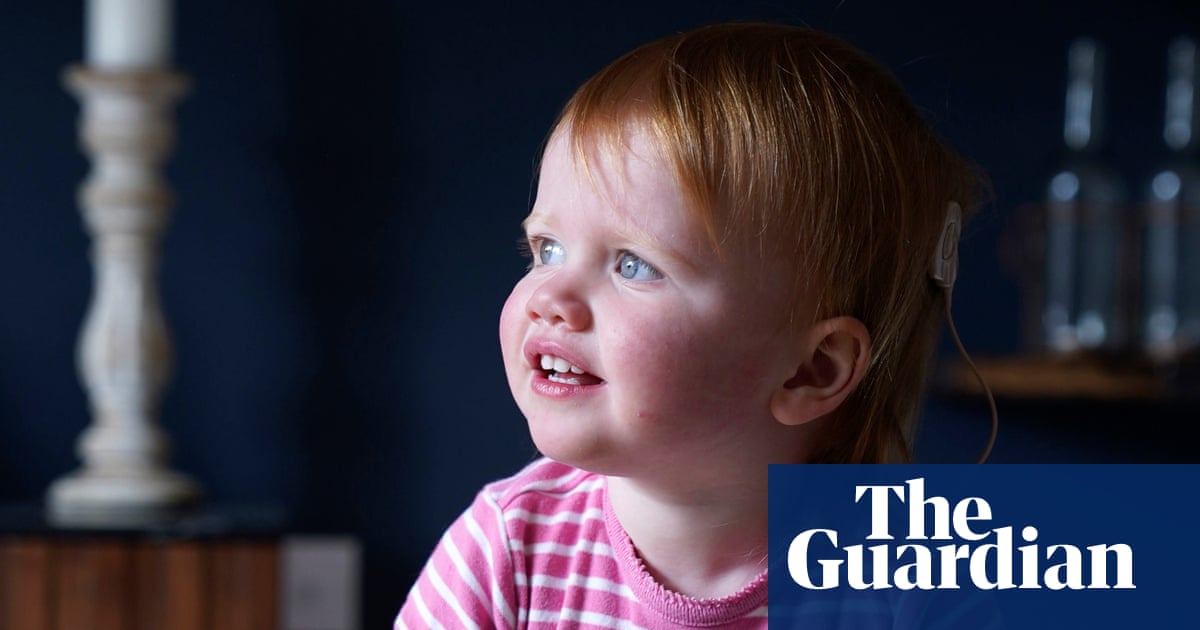
UK toddler has hearing restored in world first gene therapy trial
Opal Sandy can hear almost perfectly after groundbreaking surgery that took just 16 minutes

Opal Sandy, who was born completely deaf because of a rare genetic condition, can now hear unaided for the first time. Photograph: Andrew Matthews/PA
Medical research
UK toddler has hearing restored in world first gene therapy trial
Opal Sandy can hear almost perfectly after groundbreaking surgery that took just 16 minutesAndrew Gregory Health editor
Thu 9 May 2024 00.00 EDT
A British toddler has had her hearing restored after becoming the first person in the world to take part in a pioneering gene therapy trial, in a development that doctors say marks a new era in treating deafness.
Opal Sandy was born unable to hear anything due to auditory neuropathy, a condition that disrupts nerve impulses travelling from the inner ear to the brain and can be caused by a faulty gene.
But after receiving an infusion containing a working copy of the gene during groundbreaking surgery that took just 16 minutes, the 18-month-old can hear almost perfectly and enjoys playing with toy drums.
Her parents were left “gobsmacked” when they realised she could hear for the first time after the treatment. “I couldn’t really believe it,” Opal’s mother, Jo Sandy, said. “It was … bonkers.”
The girl, from Oxfordshire, was treated at Addenbrooke’s hospital, part of Cambridge university hospitals NHS foundation trust, which is running the Chord trial. More deaf children from the UK, Spain and the US are being recruited to the trial and will all be followed up for five years.
Prof Manohar Bance, an ear surgeon at the trust and chief investigator for the trial, said the initial results were “better than I hoped or expected” and could cure patients with this type of deafness.
“We have results from [Opal] which are very spectacular – so close to normal hearing restoration. So we do hope it could be a potential cure.”
He added: “There’s been so much work, decades of work … to finally see something that actually worked in humans …. It was quite spectacular and a bit awe-inspiring really. It felt very special.”
Auditory neuropathy can be caused by a fault in the OTOF gene, which makes a protein called otoferlin. This enables cells in the ear to communicate with the hearing nerve. To overcome the fault, the new therapy from biotech firm Regeneron sends a working copy of the gene to the ear.
A second child has also recently received the gene therapy treatment at Cambridge university hospitals, with positive results.
The overall Chord trial consists of three parts, with three deaf children including Opal receiving a low dose of gene therapy in one ear only.
A different set of three children will get a high dose on one side. Then, if that is shown to be safe, more children will receive a dose in both ears at the same time. In total, 18 children worldwide will be recruited to the trial.
Opal is the first patient globally to receive the therapy and is “the youngest globally that’s been done to date as far as we know”, Bance said.
The gene therapy – DB-OTO – is specifically for children with OTOF mutations. A harmless virus is used to carry the working gene into the patient.
The trial is “just the beginning of gene therapies”, Bance said. “It marks a new era in the treatment for deafness.”
Martin McLean, a senior policy adviser at the National Deaf Children’s Society, said deafness should never be a barrier to happiness or fulfilment. “Many families will welcome these developments, and we look forward to learning about the long-term outcomes for the children treated.”
With Opal’s hearing restored, her parents now have a fresh problem to contend with: their daughter’s new favourite hobby is slamming cutlery on the table to make as much noise as possible.